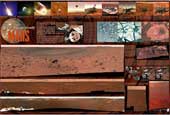
 |
|
|
|
I was intrigued by the title of this book from the minute I requested it for review, and I’m certainly glad I picked it up! Galileo and 400 Years of Telescopic Astronomy is the story of science and civilisation, retold for a twenty-first century audience. Well known authors Peter Grego and David Mannion have teamed up to produce this spellbinding work, illustrating how astronomy has shaped human society from its inglorious inception some 30,000 years ago to the present day. Central to Grego and Mannion’s theme is humanity’s predilection for measuring things and how these activities have improved our lives. Tracing a long line from Neolithic, pre-classical and classical civilisation, as well as the contributions of the Islamic scholars after the fall of the Roman Empire in the West, the authors set the scene for the extraordinary achievements of the Renaissance Italian scientist, Galileo Galilei, who in a series of 14 or so experiments cast off the fuzzy thinking of classical antiquity and replaced it with refreshingly new (and dare I say correct) interpretations of how the world works. What makes this book unique is its accessibility. Instead of the usual lofty discourses seen in other books, the authors warmly encourage you to perform your own experiments. For example, I love the idea of improving on Galileo’s measurement of the acceleration from gravity by recording a falling body with your mobile phone! What does the future hold? Will Mankind venture to the stars? Will humanity really encounter advanced extraterrestrial civilizations? What sorts of habitats will we seek out in our inevitable expansion into space? Grego and Mannion paint an insightful picture that, rightly or wrongly, wholeheartedly deserves a read. This is a great book and well worth the modest price tag Neil English |
|
|
|
2009 Yearbook This 132-page special edition features the ultimate observing guide for 2009, a review of all the biggest news stories of 2008, in depth articles covering all aspects of astronomy and space missions for 2009, previews of International Year of Astronomy events and much, much more. This 132-page special edition features the ultimate observing guide for 2009, a review of all the biggest news stories of 2008, in depth articles covering all aspects of astronomy and space missions for 2009, previews of International Year of Astronomy events and much, much more.Infinity Rising  This special publication features the photography of British astro-imager Nik Szymanek and covers a range of photographic methods from basic to advanced. Beautiful pictures of the night sky can be obtained with a simple camera and tripod before tackling more difficult projects, such as guided astrophotography through the telescope and CCD imaging. This special publication features the photography of British astro-imager Nik Szymanek and covers a range of photographic methods from basic to advanced. Beautiful pictures of the night sky can be obtained with a simple camera and tripod before tackling more difficult projects, such as guided astrophotography through the telescope and CCD imaging.Exploring Mars  Astronomy Now is pleased to announce the publication of Exploring Mars. The very best images of Mars taken by orbiting spacecraft and NASA's Spirit and Opportunity rovers fill up the 98 glossy pages of this special edition! Astronomy Now is pleased to announce the publication of Exploring Mars. The very best images of Mars taken by orbiting spacecraft and NASA's Spirit and Opportunity rovers fill up the 98 glossy pages of this special edition!Mars rover poster  This new poster features some of the best pictures from NASA's amazing Mars Exploration Rovers Spirit and Opportunity. This new poster features some of the best pictures from NASA's amazing Mars Exploration Rovers Spirit and Opportunity. |
||||||||||||||||||||||||